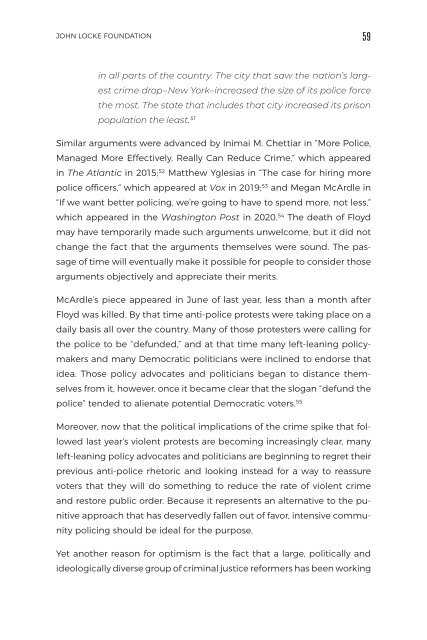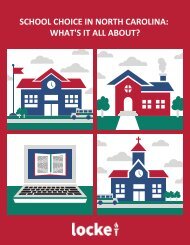Keeping the Peace Through Intensive Community Policing
As crime soars and the breakdown of public order takes its toll on our country, analysis from the John Locke Foundation signals it’s time to adopt a different approach to crime control, one that shifts the focus further upstream, looking at prevention models, rather than exclusively on punitive measures. In this July 2021 report, John Locke Foundation researcher and author Jon Guze explains that the current focus of catching, convicting, and punishing perpetrators after crimes have been committed has come with enormous economic and social costs. However, intensive community policing has proven successful at deterring crime and maintaining order, which leads to safer communities and fewer people living in poverty. Guze recommends a four-pronged plan to move forward with community policing: (1) hire more police officers (2) increase the pay for police officers (3) arm police officers with state-of-the-art training, direction, and support (4) deploy police officers as “peacekeepers” in communities that suffer most from crime and disorder.
As crime soars and the breakdown of public order takes its toll on our country, analysis from the John Locke Foundation signals it’s time to adopt a different approach to crime control, one that shifts the focus further upstream, looking at prevention models, rather than exclusively on punitive measures. In this July 2021 report, John Locke Foundation researcher and author Jon Guze explains that the current focus of catching, convicting, and punishing perpetrators after crimes have been committed has come with enormous economic and social costs.
However, intensive community policing has proven successful at deterring crime and maintaining order, which leads to safer communities and fewer people living in poverty. Guze recommends a four-pronged plan to move forward with community policing:
(1) hire more police officers
(2) increase the pay for police officers
(3) arm police officers with state-of-the-art training, direction, and support
(4) deploy police officers as “peacekeepers” in communities that suffer most from crime and disorder.
You also want an ePaper? Increase the reach of your titles
YUMPU automatically turns print PDFs into web optimized ePapers that Google loves.
JOHN LOCKE FOUNDATION<br />
59<br />
in all parts of <strong>the</strong> country. The city that saw <strong>the</strong> nation’s largest<br />
crime drop–New York–increased <strong>the</strong> size of its police force<br />
<strong>the</strong> most. The state that includes that city increased its prison<br />
population <strong>the</strong> least. 51<br />
Similar arguments were advanced by Inimai M. Chettiar in “More Police,<br />
Managed More Effectively, Really Can Reduce Crime,” which appeared<br />
in The Atlantic in 2015; 52 Mat<strong>the</strong>w Yglesias in “The case for hiring more<br />
police officers,” which appeared at Vox in 2019; 53 and Megan McArdle in<br />
“If we want better policing, we’re going to have to spend more, not less,”<br />
which appeared in <strong>the</strong> Washington Post in 2020. 54 The death of Floyd<br />
may have temporarily made such arguments unwelcome, but it did not<br />
change <strong>the</strong> fact that <strong>the</strong> arguments <strong>the</strong>mselves were sound. The passage<br />
of time will eventually make it possible for people to consider those<br />
arguments objectively and appreciate <strong>the</strong>ir merits.<br />
McArdle’s piece appeared in June of last year, less than a month after<br />
Floyd was killed. By that time anti-police protests were taking place on a<br />
daily basis all over <strong>the</strong> country. Many of those protesters were calling for<br />
<strong>the</strong> police to be “defunded,” and at that time many left-leaning policymakers<br />
and many Democratic politicians were inclined to endorse that<br />
idea. Those policy advocates and politicians began to distance <strong>the</strong>mselves<br />
from it, however, once it became clear that <strong>the</strong> slogan “defund <strong>the</strong><br />
police” tended to alienate potential Democratic voters. 55<br />
Moreover, now that <strong>the</strong> political implications of <strong>the</strong> crime spike that followed<br />
last year’s violent protests are becoming increasingly clear, many<br />
left-leaning policy advocates and politicians are beginning to regret <strong>the</strong>ir<br />
previous anti-police rhetoric and looking instead for a way to reassure<br />
voters that <strong>the</strong>y will do something to reduce <strong>the</strong> rate of violent crime<br />
and restore public order. Because it represents an alternative to <strong>the</strong> punitive<br />
approach that has deservedly fallen out of favor, intensive community<br />
policing should be ideal for <strong>the</strong> purpose.<br />
Yet ano<strong>the</strong>r reason for optimism is <strong>the</strong> fact that a large, politically and<br />
ideologically diverse group of criminal justice reformers has been working











